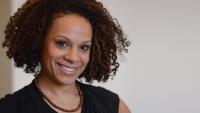Diana Hernández

Assistant Professor of Sociomedical Sciences
Hernández studies housing, energy, health and equity with particular emphasis on evaluating the impacts of policies and structural changes in the built environment. Her current research advances the concept of energy insecurity using an innovative, community-based, participatory and mixed-method research approach to examine the impact of housing and energy interventions on health, particularly in low-income urban households.
How does your interest in energy insecurity fit into the larger landscape of public health research?
Energy insecurity means the inability to meet basic household energy needs, a phenomenon which poses significant and unexposed health and social challenges for vulnerable groups. Conceptually, energy insecurity sits at the intersection of sociological literature on material hardships of the poor and public health literature on social determinants of health. And, it parallels more established, concepts such as food insecurity. Because we’re more attentive to energy and environment these days, I’m confident that energy insecurity will be increasingly called on to explain the associations between poverty, poor housing quality, and health outcomes like asthma and stress.
What are some of your other projects that you’re currently working on or ideas you have for future research?
I’m involved in two energy-insecurity related projects at varying stages of completion. The first is a pilot project to examine the impact of energy efficiency interventions on the health and finances of low-income householders. The second evaluates changes associated with Clean Heat policies that phase out the use of high-polluting fuel oil in NYC. We are looking at changes in indoor/outdoor air quality in residential environments using exposure assessments and surveys as well as key informant interviews. I also collaborate on a project currently assessing health and educational outcomes associated with capital improvements and sustainable renovations in New York City’s public housing.
The public housing work comes straight from the headlines. Does that kind of translational approach inform your work?
Absolutely! Every project I work on has implications for policy or service provision and a mission to advance health and social equity. As a board member at South Bronx Overall Economic Development, Corp., I guide research and evaluation efforts and partner with them on initiatives such as smoke-free housing implementation. I am also a founding member of the West Harlem Clean Heat Council, an advisory panel for the Clean Heat Clean Energy Initiative sponsored by WE ACT for Environmental Justice. I’m also the founder and principal of a social impact real estate venture focusing on sustainable housing in the South Bronx. Especially as a native Bronxite, translating science this way has great importance for me.
What is your favorite thing about teaching or mentoring?
I value straight talk, encourage innovation and big thinking, and help those I mentor to imagine a world without limits. In mentoring students at the Mailman School, I impart the most important lessons of my own story and hope that inspires them to be bold and take chances, to be of service, and to be relentless in their pursuit of knowledge, truth, and justice. If anyone can lay a claim to that kind of aspiration, it’s people working in public health.